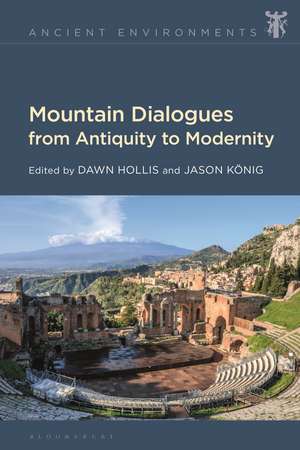Mountain Dialogues from Antiquity to Modernity: Ancient Environments
Editat de Dawn Hollis, Professor Jason Königen Limba Engleză Paperback – 16 noi 2022
| Toate formatele și edițiile | Preț | Express |
|---|---|---|
| Paperback (1) | 198.57 lei 6-8 săpt. | +74.38 lei 7-13 zile |
| Bloomsbury Publishing – 16 noi 2022 | 198.57 lei 6-8 săpt. | +74.38 lei 7-13 zile |
| Hardback (1) | 598.99 lei 6-8 săpt. | |
| Bloomsbury Publishing – 5 mai 2021 | 598.99 lei 6-8 săpt. |
Preț: 198.57 lei
Preț vechi: 258.29 lei
-23% Nou
Puncte Express: 298
Preț estimativ în valută:
37.100€ • 41.44$ • 32.04£
37.100€ • 41.44$ • 32.04£
Carte tipărită la comandă
Livrare economică 24 aprilie-08 mai
Livrare express 20-26 martie pentru 84.37 lei
Preluare comenzi: 021 569.72.76
Specificații
ISBN-13: 9781350194106
ISBN-10: 1350194107
Pagini: 272
Ilustrații: 8 bw illus
Dimensiuni: 156 x 234 x 18 mm
Greutate: 0.38 kg
Editura: Bloomsbury Publishing
Colecția Bloomsbury Academic
Seria Ancient Environments
Locul publicării:London, United Kingdom
ISBN-10: 1350194107
Pagini: 272
Ilustrații: 8 bw illus
Dimensiuni: 156 x 234 x 18 mm
Greutate: 0.38 kg
Editura: Bloomsbury Publishing
Colecția Bloomsbury Academic
Seria Ancient Environments
Locul publicării:London, United Kingdom
Caracteristici
Challenges the traditional (and highly influential) narrative that assumes a stark shift in attitudes in the eighteenth century, by highlighting continuities and similarities between premodern and modern responses
Notă biografică
Dawn Hollis is a postdoctoral researcher at the University of St Andrews, UK, working with Jason König on a Leverhulme Trust research project entitled 'Mountains in Ancient Literature and their Postclassical Reception'. Her work on the history of mountains has appeared in Alpinist and Interdisciplinary Studies in Literature and the Environment. Jason König is Professor of Greek at the University of St Andrews, UK. He has published widely on the Greek literature of the Roman empire. He is currently working on a book on mountains in the literature and culture of the ancient Mediterranean.
Cuprins
Notes on ContributorsAcknowledgementsNote on translations and Order of Chapters Introduction - Dawn Hollis (University of St Andrews, UK) and Jason König (University of St Andrews, UK)1. Gessner's mountain sublime - Dan Hooley (University of Missouri, USA)2. 'Famous from all antiquity': Etna in classical myth and Romantic poetry - Cian Duffy (Lund University, Sweden)3. The 'authority of the ancients'? Seventeenth-century natural philosophy and aesthetic responses to mountains - Dawn Hollis (University of St Andrews, UK)4. Toward a continuity of Alpinism in antiquity, premodernity, and modernity: Josias Simler's De Alpibus Commentarius (1574) and W. A. B. Coolidge's French translation from 1904 - Sean Ireton (University of Missouri, USA)5. Mountains and the holy in late antiquity - Douglas Whalin (The Catholic University of America, USA)6. Erudite retreat: Jerome and Francis in the mountains - Janice Hewlett Koelb (University of North Carolina at Chapel Hill, USA)7. Sublime visions of Virginia: Thomas Jefferson's Romantic mountainscapes - Alley Marie Jordan (University of Edinburgh, UK)8. Edward Dodwell in the Peloponnese: Mountains and the classical past in nineteenth-century Mediterranean travel writing - Jason König (University of St Andrews, UK)9. The top story: truth and sublimity in Patrick Brydone's account of his 1770 ascent of Mt Etna - Gareth D. Williams (University of Columbia, USA)10. Mountains of memory: a phenomenological approach to mountains in fifth-century BCE Greek tragedy - Chloe Bray (University of St Andrews, UK)11. Mountains, identity, and the legend of King Brennus in the early modern English imaginary - Harriet Archer (University of St Andrews, UK)12. Upland on Mont Ventoux - Peter Hansen (Worcester Polytechnic Institute, UK) NotesBibliographyIndex
Recenzii
Given the tremendous variety of the topics covered in this collection, even non-specialists can expect to find something of potential interest, from classical myths to late antique or medieval religious figures, from early modern English legends to 18th- and 19th-century travelers' accounts, to the US politician Thomas Jefferson's renowned mountain retreat Monticello.
[Hollis and König] not only expand and complicate the modern conceptualisation of the cultural meaning of mountains, but their dialogic approach significantly revises many current historical and literary assumptions.
A reassessment of existing presuppositions as to the value and importance of mountains at different points in time from antiquity onwards, as well as an instructive example of how to edit a volume that stays focused despite a large chronological scope.
The appreciation of mountains in the premodern era, traditionally dismissed by scholars, is given a fresh longue-durée perspective in Mountain Dialogues from Antiquity to Modernity that moreover shows how in later periods mountains were viewed through the lens of the classical past.
[Hollis and König] not only expand and complicate the modern conceptualisation of the cultural meaning of mountains, but their dialogic approach significantly revises many current historical and literary assumptions.
A reassessment of existing presuppositions as to the value and importance of mountains at different points in time from antiquity onwards, as well as an instructive example of how to edit a volume that stays focused despite a large chronological scope.
The appreciation of mountains in the premodern era, traditionally dismissed by scholars, is given a fresh longue-durée perspective in Mountain Dialogues from Antiquity to Modernity that moreover shows how in later periods mountains were viewed through the lens of the classical past.







